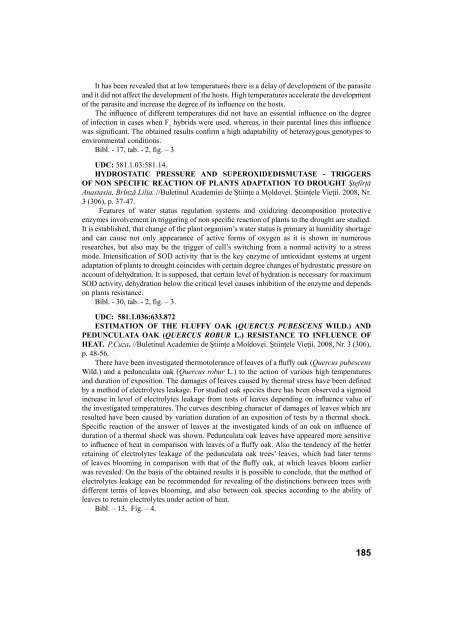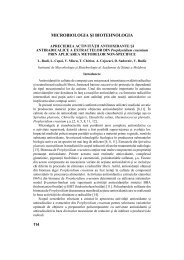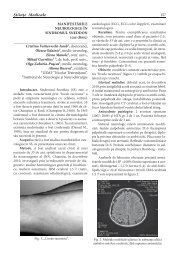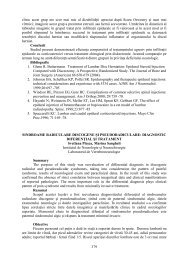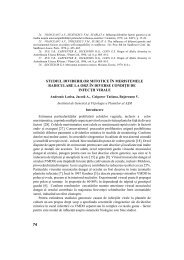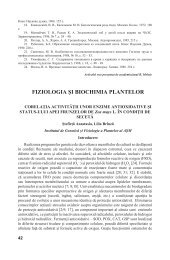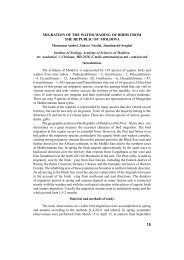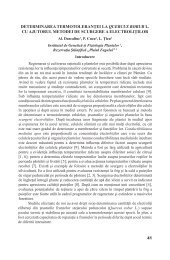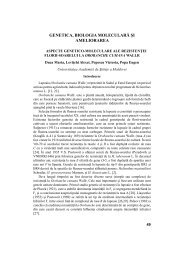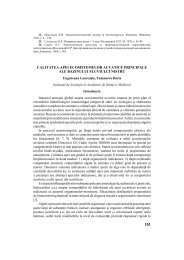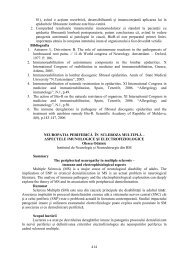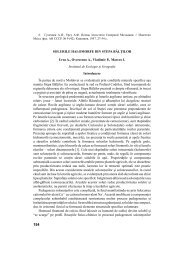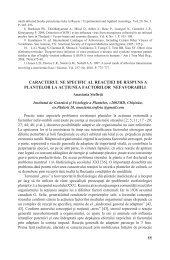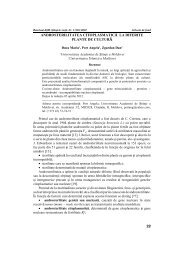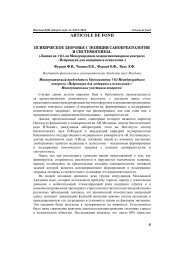198 CUPRINS
198 CUPRINS
198 CUPRINS
You also want an ePaper? Increase the reach of your titles
YUMPU automatically turns print PDFs into web optimized ePapers that Google loves.
It has been revealed that at low temperatures there is a delay of development of the parasite<br />
and it did not affect the development of the hosts. High temperatures accelerate the development<br />
of the parasite and increase the degree of its in uence on the hosts.<br />
The in uence of different temperatures did not have an essential in uence on the degree<br />
of infection in cases when F 1 hybrids were used, whereas, in their parental lines this in uence<br />
was signi cant. The obtained results con rm a high adaptability of heterozygous genotypes to<br />
environmental conditions.<br />
Bibl. - 17, tab. - 2, g. – 3<br />
UDC: 581.1.03:581.14.<br />
HYDROSTATIC PRESSURE AND SUPEROXIDEDISMUTASE - TRIGGERS<br />
OF NON SPECIFIC REACTION OF PLANTS ADAPTATION TO DROUGHT Ştefîrţă<br />
Anastasia, Brînză Lilia. //Buletinul Academiei de Ştiinţe a Moldovei. Ştiinţele Vieţii. 2008, Nr.<br />
3 (306), p. 37-47.<br />
Features of water status regulation systems and oxidizing decomposition protective<br />
enzymes involvement in triggering of non speci c reaction of plants to the drought are studied.<br />
It is established, that change of the plant organism’s water status is primary at humidity shortage<br />
and can cause not only appearance of active forms of oxygen as it is shown in numerous<br />
researches, but also may be the trigger of cell’s switching from a normal activity to a stress<br />
mode. Intensi cation of SOD activity that is the key enzyme of antioxidant systems at urgent<br />
adaptation of plants to drought coincides with certain degree changes of hydrostatic pressure on<br />
account of dehydration. It is supposed, that certain level of hydration is necessary for maximum<br />
SOD activity, dehydration below the critical level causes inhibition of the enzyme and depends<br />
on plants resistance.<br />
Bibl. - 30, tab. - 2, g. – 3.<br />
UDC: 581.1.036:633.872<br />
ESTIMATION OF THE FLUFFY OAK (QUERCUS PUBESCENS WILD.) AND<br />
PEDUNCULATA OAK (QUERCUS ROBUR L.) RESISTANCE TO INFLUENCE OF<br />
HEAT. P.Cuza. //Buletinul Academiei de Ştiinţe a Moldovei. Ştiinţele Vieţii. 2008, Nr. 3 (306),<br />
p. 48-56.<br />
There have been investigated thermotolerance of leaves of a uffy oak (Quercus pubescens<br />
Wild.) and a pedunculata oak (Quercus robur L.) to the action of various high temperatures<br />
and duration of exposition. The damages of leaves caused by thermal stress have been de ned<br />
by a method of electrolytes leakage. For studied oak species there has been observed a sigmoid<br />
increase in level of electrolytes leakage from tests of leaves depending on in uence value of<br />
the investigated temperatures. The curves describing character of damages of leaves which are<br />
resulted have been caused by variation duration of an exposition of tests by a thermal shock.<br />
Speci c reaction of the answer of leaves at the investigated kinds of an oak on in uence of<br />
duration of a thermal shock was shown. Pedunculata oak leaves have appeared more sensitive<br />
to in uence of heat in comparison with leaves of a uffy oak. Also the tendency of the better<br />
retaining of electrolytes leakage of the pedunculata oak trees’ leaves, which had later terms<br />
of leaves blooming in comparison with that of the uffy oak, at which leaves bloom earlier<br />
was revealed. On the basis of the obtained results it is possible to conclude, that the method of<br />
electrolytes leakage can be recommended for revealing of the distinctions between trees with<br />
different terms of leaves blooming, and also between oak species according to the ability of<br />
leaves to retain electrolytes under action of heat.<br />
Bibl. – 13, Fig. – 4.<br />
185


